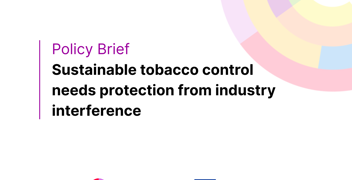Twenty years after the European Union ratified the WHO Framework Convention on Tobacco Control (WHO FCTC), a new WHO/Europe report, developed with contributions from experts in the JA PreventNCD, takes stock of two decades of progress and the challenges that lie ahead.
The report, Two decades of the implementation of the WHO Framework Convention on Tobacco Control in the European Union: progress, challenges and the road ahead, highlights the EU’s active role in global tobacco control and underlines significant policy achievements across Member States. It also warns that despite progress, tobacco remains one of the leading causes of preventable death and disease in Europe, claiming more than half a million lives each year.
A milestone in European tobacco control
Since adopting the WHO FCTC in 2005, the EU has built a strong legal and policy framework that aligns with the Convention’s objectives. However, prevalence rates remain high, with marked differences between countries. Emerging tobacco and nicotine products, including e-cigarettes and nicotine pouches, are gaining popularity, particularly among young people. These trends risk undermining years of progress and call for renewed political commitment and stronger safeguards.
The forthcoming revisions of the Tobacco Products Directive, Tobacco Advertising Directive and the Tobacco Taxation Directive will be decisive for achieving the EU Cancer Plan goal of less than 5% of the population using tobacco by 2040 – called as Tobacco-Free Generation.
“To achieve the goal, the key EU Directives need to be future-proofed, addressing the continuous market entry of new attractive nicotine products. We must also continue to ensure that public health policies are protected from commercial influence and that there is strong collaboration and active information exchange between EU Member States and the Commission in tobacco control,” said Hanna Ollila, Cross-cutting Theme Coordinator on Tobacco in JA PreventNCD.
Industry interference: a persistent threat
One of the report’s key findings is the continued influence of the tobacco and related industries on public health policymaking. Despite the WHO FCTC’s Article 5.3, which obliges Parties to protect public health policies from commercial interference, implementation remains partial and inconsistent across Member States.
To complement WHO/Europe’s findings, JA PreventNCD has published a policy brief on How Sustainable Tobacco Control Needs Protection From Industry Interference, developed by partners working on alcohol and tobacco related perspectives in all policies within the Health in All Policies work package. The brief explores how European countries can strengthen their implementation of Article 5.3 and better shield policymaking from commercial interests by better monitoring industry interference.
The policy brief highlights how industry tactics are evolving, from lobbying and funding biased research to using social media influencers and front groups to shape opinion and delay regulation. It calls for:
- Establishing national monitoring systems for industry interference.
- Ensuring transparency mechanisms such as lobby registers and declarations of interest.
- Empowering civil society to monitor and report on industry influence.
- Applying these safeguards consistently across all tobacco and nicotine products.
Together, the WHO/Europe report and JA PreventNCD’s policy brief send a unified message: protecting policy from industry interference is essential to achieving a tobacco-free Europe. Looking ahead to COP11
The timing of the report is significant. Later this month, the EU will convene with other Parties in Geneva for the 11th Conference of the Parties (COP11) to the WHO FCTC, where discussions will focus on accelerating the implementation across several Articles of the Convention.
Recently, the Convention Secretariat urged Parties to stay vigilant as the tobacco industry is intensifying efforts to interfere with the work of the COP, by example by attempting to influence the selection and positions of the national delegations.
JA PreventNCD supports the call for a future-oriented, evidence-based approach to tobacco control that prioritises prevention, protects youth and ensures transparency in policymaking.

